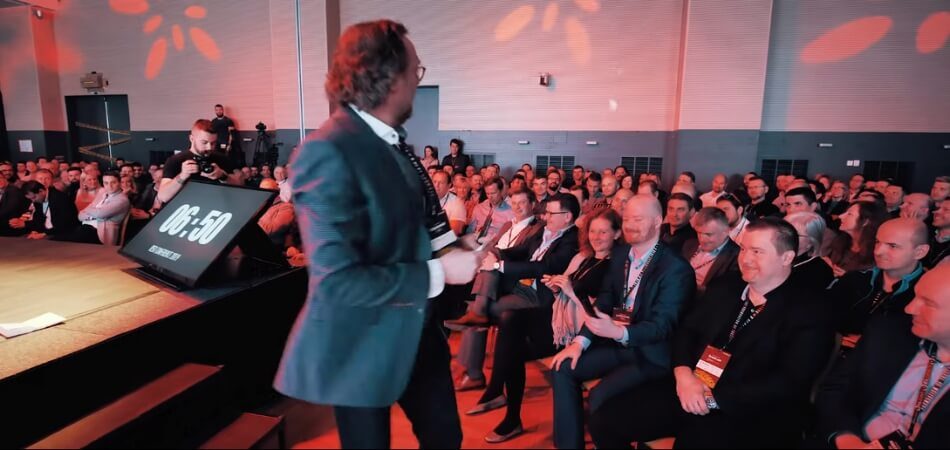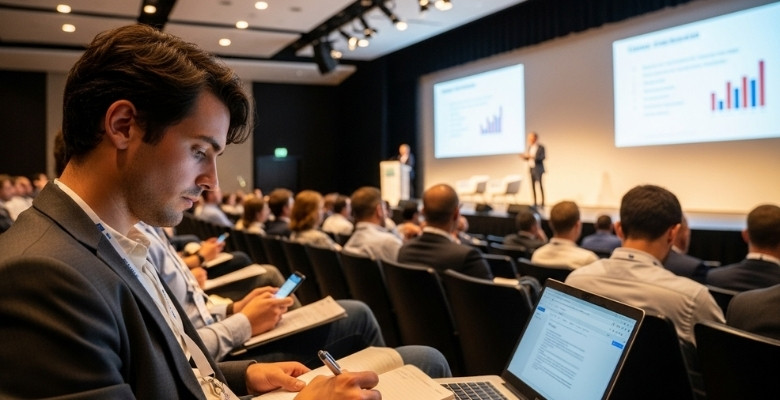Conferences are special gatherings where people come together to share knowledge, skills, and fresh ideas. They are not just about talks or presentations but also about learning in new ways. Many people often think about what is the motivation to attend a conference?
Attending a conference builds skills, expands networks, and sparks ideas. It offers career growth, industry updates, and valuable certificates. Engaging with experts boosts confidence and motivation. Sharing and learning in a live setting helps participants grow both personally and professionally.
If you are curious about this topic, you will find all the details explained in this article. Each section highlights the reasons that make conferences meaningful, so you can clearly understand how they can bring both personal and professional benefits.
What is the Motivation to Attend a Conference?
When people attend a conference, they usually have a mix of reasons that make the event valuable for them. These reasons can be about personal growth, career goals, or even simple curiosity. Let’s look at some common motivations in detail.
Learning New Skills
Conferences often include workshops, sessions, or talks that focus on practical skills. These could be technical skills, communication tips, or even leadership lessons. The best part is that you can learn directly from experts who share real examples and easy-to-use methods.
Meeting Professionals
One big reason people attend is to connect with others in the same field. You get the chance to meet professionals, exchange ideas, and even ask questions. These meetings can lead to helpful contacts who might support your work later.
Fresh Ideas
Hearing different speakers and panel discussions gives you fresh perspectives. Sometimes, even a single idea can spark a new plan for your job or project. For example, if you’re preparing for global events like an international conference in Canada, Australia, the USA, or any other country, you can return with creative ideas that bring real improvements to your work.
Career Growth
Many conferences focus on building careers. By attending, you can learn about trends, find ways to improve your profile, and even prepare for future opportunities. This kind of growth is not only about knowledge but also about showing interest in your field.
Certificates of Value
Some conferences give certificates after attendance or participation. These certificates can be a good addition to your CV or portfolio. They show proof that you invested time in learning and improving yourself, which employers often appreciate.
Check out what the conference attending certificate looks like
Industry Updates
Conferences usually share the latest updates in the industry. You can learn about new tools, upcoming changes, or methods that are becoming popular. Staying updated keeps you ahead and helps you adapt quickly in your professional work.
Inspiration Boost
Listening to successful professionals share their stories can be very motivating. Their words and experiences can inspire you to aim higher and work harder. It is also encouraging to see that challenges can be turned into achievements with the right mindset.
Sharing Knowledge
Conferences are not just about listening. Many events give you the chance to ask questions, join discussions, or even present your own ideas. This builds confidence and lets you share your knowledge with others in a supportive environment.
Building Confidence
Standing in a room full of professionals may feel challenging at first, but it helps build confidence. Talking to new people, asking questions, and sharing your thoughts make you more comfortable in such environments, which is valuable in both work and life.
Attending a conference is more than just sitting through talks. It helps you learn, connect, and grow in different ways. The benefits you gain depend on how much you take part, so making the most of it always matters.
How Do Conferences Help Me Learn Better Than Reading Alone?
Reading is a great way to collect knowledge, but sometimes words on a page can feel too flat to explain tricky ideas. Conferences add more color, energy, and clarity to the learning process. Let’s look at how this happens.
Expert Talks
At a conference, you get to listen to experts who have years of practice in their field. Instead of just reading theories, you hear real-life examples that show how those ideas work. Experts also share fresh updates that might not be in books yet.
Live Questions
Books and articles give you answers that are already written down. But at a conference, you can raise your hand and ask directly if something feels unclear. Getting an instant reply makes the concept stick in your mind more firmly.
Hands-On Workshops
Workshops are like practice sessions where you don’t just read, you actually do. For example, you might try a new tool, solve a case study, or build something in small groups. This hands-on style makes learning more active and memorable.
Real Demos
Watching a live demo helps you see how things actually work. A step-by-step display clears doubts faster than reading long instructions. Seeing the results unfold in front of you makes even complex ideas feel easier and more practical.
Building Interest
Conferences also motivate you by showing how exciting a subject can be. Even expressing interest in attending a conference can highlight your commitment to growth and your eagerness to gain fresh ideas. It’s about showing that you care to learn more.
Conferences make learning richer and easier by mixing expert talks, live interaction, practice, and real-world examples. They bring ideas to life in ways that reading alone often cannot.
How Can I Turn Networking Into Real Results From Conferences?
When you go to a conference, meeting people can feel exciting, but also a bit overwhelming. You hear new ideas, meet many faces, and exchange cards. But turning those short talks into something meaningful takes a few smart steps. Let’s go through them one by one.
Set Clear Goal
Before the event starts, make a goal to meet at least five people. This keeps you focused and gives you a clear number to work toward. Meeting fewer can feel like you missed chances, while aiming too high may feel stressful.
Short Introduction
Have a simple 20-second introduction ready about who you are and what you do. Keep it short and clear so others can remember you easily. A quick intro works better than long explanations, especially when everyone is meeting many people.
Here’s a sample you can use:
“Hi, I’m Alex. I work in digital marketing and help small businesses grow their online presence. I’m here to learn new ideas and connect with people in the industry.”
Quick Notes
Right after you talk to someone, write down a short note about them. It can be something they said, their work, or what you both discussed. These notes help you recall details later, instead of forgetting important parts of the conversation.
Timely Follow-up
Reach out to the people you met within 48 hours. A short message, email, or even a LinkedIn request shows you value the conversation. Acting fast keeps the memory fresh for both of you and builds a stronger connection.
Keep it Simple
You don’t need a perfect plan to get results from networking. A small goal, quick intro, short notes, and fast follow-ups can make a big difference. Small steps like these can turn casual meetings into real opportunities.
Networking at conferences doesn’t need to feel complicated. With clear goals and simple actions, every chat can become more useful. Keep practicing these steps, and you’ll start seeing real results over time.
How Do I Make the Best Use of Session Time in a Conference?
When you attend a conference, every session is a chance to learn something new. The time goes fast, and sometimes it feels hard to catch everything. With a few simple habits, you can focus better during talks. Here are some ways to make the best use of session time.
Front Row
Choosing a seat close to the front makes a big difference. You will hear the speaker clearly without background noise and see the slides better. Sitting in front also helps you stay alert and makes distractions less likely, which keeps your focus sharp throughout the session.
Short Notes
Instead of writing everything down, focus only on key points. Jot down short sentences or even just strong keywords. Writing too much can break your attention, but simple notes let you listen well. Later, you can easily recall the most important details.
Three Takeaways
After every session, pause to think about three big ideas. These can be lessons, tips, or even new ways of thinking. Writing them helps you remember. By keeping just three, you avoid clutter and focus on what really matters most.
One Action
It is useful to end each session with one clear action. Maybe you try a new tool, test a method, or change a habit. Having one step makes talks more practical. It means you walk away with something you can actually use.
Ask Question
Whenever you can, raise a clear and short question. Doing this shows interest, helps you understand better, and may even start a conversation. A good question also helps others in the room who had the same thought but stayed quiet.
Conference sessions can feel fast, but simple steps make them effective. Taking notes, asking questions, and planning actions make your time worth it. Even small efforts bring big results when used with focus. Keep practicing these habits daily.
What Should I Do Right After the Conference?
After a conference ends, the real value comes from what you do next. You’ve gathered ideas, met new people, and listened to inspiring talks. But without action, those moments can easily fade away. Let’s explore some simple steps you can take right after the event.
Thank-you Notes
Reaching out with a thank-you message within 48 hours is powerful. It shows respect and reminds the person about your conversation while it is still fresh. Keep it short and friendly, mentioning something specific from your chat. This small step leaves a lasting impression.
Here’s a sample thank-you note you can use:
Subject: Thank You for Connecting at [Conference Name]
Dear [Name],
It was a pleasure meeting you at [Conference Name]. I truly appreciated our conversation about [specific detail you discussed, e.g., “the challenges of digital marketing for small businesses”]. Your insights were thoughtful, and I learned a lot from your perspective.
I look forward to keeping in touch and exploring ways we might collaborate in the future. Please don’t hesitate to reach out if I can be of any help on your projects.
Best regards,
[Your Full Name]
[Your Job Title / Company]
[Your Contact Information]
Team Recap
Sharing a short recap with your team helps spread the knowledge. Highlight the most useful tips, tools, or strategies you picked up. This way, others also benefit from your time at the conference. A recap also shows your team that you value teamwork and learning.
Test Ideas
Scheduling one test of a new idea keeps your learning active. It doesn’t need to be perfect or large, just something small to try. Acting quickly avoids delay and helps you see results faster. This also builds confidence in applying new knowledge effectively.
Set Date
Marking a check-in date 30 days later keeps you on track. This reminder gives you time to apply what you learned and then review progress. Setting a clear date ensures you don’t forget your goals. It also helps measure whether the new ideas worked.
Stay Consistent
Some people end up feeling less confident after attending conferences if they don’t put new ideas into practice quickly, which is why follow-up actions are so important. Staying consistent with small steps turns big ideas into real progress. The key is doing, not just listening.
What happens after a conference can shape the results you get. Sending quick thank-you messages builds stronger relationships and respect. Testing new ideas makes learning practical and useful. Setting dates and sharing recaps help ideas stick longer. Consistent effort is what creates lasting value.
How Do I Measure if the Conference Was Worth It?
To know if a conference was worth it, you can use a simple way to measure: compare the value you got with the cost you paid. But instead of only looking at money, think about different types of value that can come from a conference.
Step 1: Write Down the Costs
Start with the full cost of attending. This includes:
- Registration or ticket fees
- Travel (flights, train, fuel, etc.)
- Hotel or stay
- Food and local transport
- Time spent away from your usual work
Add these up to get the total cost.
Step 2: Look at the Value You Gained
Value is not always money. It can show up in different forms:
- Leads or business contacts: Did you meet people who could turn into clients, partners, or collaborators?
- Knowledge and skills: Did you attend workshops or talks that gave you practical ideas to apply in your work?
- Time saved: Did the event give you tools or contacts that will make your work faster or easier in the future?
- Brand visibility: If you or your company spoke, presented, or had a booth, did it help raise awareness of your work?
Step 3: Compare Value Against Cost
Once you have both numbers, ask yourself:
- Did the contacts, knowledge, or opportunities have more value than the money and time you spent?
- If you made one or two strong leads that could turn into income, does that already cover your cost?
- Even if you didn’t get business leads, did the skills or ideas you took back make the trip useful?
Step 4: Think About Long-Term Payoff
Sometimes the results show later. A person you met at the event might reach out months after. A skill you learned may save you money or open doors later. Keep this in mind before you judge the trip only on short-term outcomes.
If the benefits you gained are greater than what you spent, then the conference was worth it. If not, you’ll know to be more selective about the events you choose next time.
FAQs About What is the Motivation to Attend a Conference?
Conferences bring many chances to learn, connect, and grow, but people often have extra questions about why they should attend. These FAQs will help you understand the deeper reasons and practical benefits that motivate people to join conferences.
Why is Attending a Conference Important for Personal Development?
Attending a conference gives you time to step out of your daily routine and focus on self-improvement. You hear from people who have achieved success and learn how they did it. This inspires you to think differently about your own goals. It also builds your confidence by showing you new ways to grow.
How Does a Conference Improve Communication Skills?
Conferences often involve meeting new people, asking questions, and joining group discussions. These moments let you practice clear speaking and active listening. Over time, this helps you express your thoughts more confidently. Better communication skills are useful in both personal life and professional work.
What Role Do Conferences Play in Problem Solving?
Conferences bring together people from different backgrounds and industries. Listening to their methods and ideas can give you solutions you never thought about. You may also share your own challenges and get feedback. This exchange of ideas makes problem-solving more creative and effective.
How Does Attending a Conference Encourage Lifelong Learning?
A conference reminds you that learning does not stop after school or college. Every session, workshop, or talk adds something new to your knowledge. It shows that industries are always changing and there’s always more to learn. This mindset keeps you open to growth throughout your life.
Why Do Conferences Help in Building Leadership Qualities?
When you see how experts lead discussions or share their knowledge, you learn by example. Some conferences also let you take part in group tasks, which improve decision-making and teamwork. These moments strengthen your leadership skills in a safe environment. Over time, you become more confident in guiding others.
How Can Attending a Conference Increase Motivation at Work?
Conferences fill you with new ideas and energy that you bring back to your workplace. You might discover faster ways of doing tasks or tools that save time. Sharing these with your team can improve the work environment. This fresh boost of motivation can make your daily work feel more exciting.
Why Do Conferences Strengthen Professional Identity?
Being part of a conference makes you feel included in a bigger community. It reminds you that your work is connected to a larger field. Seeing others share the same goals makes you feel proud of your role. This stronger professional identity helps you value your contribution more.
How Do Conferences Help in Building Discipline?
Attending a conference requires planning, time management, and focus during sessions. These habits naturally improve your discipline. When you return, you may find yourself more organized in handling tasks. This discipline adds structure to both your personal and professional life.
Why Is Attending a Conference Useful for Creativity?
Conferences show you ideas, tools, and stories that spark new ways of thinking. Sometimes just hearing a fresh perspective can trigger creative solutions. Being in a different environment away from daily routines also helps creativity flow. This creative push can be applied to work, projects, or personal goals.
How Does Attending a Conference Build Self-awareness?
When you attend a conference, you compare your knowledge and skills with others in the same field. This makes you more aware of your strengths and areas that need improvement. You may also discover interests you didn’t notice before. Building self-awareness helps you make better choices for your future.
Conclusion
Attending a conference is more than just showing up; it is about making the best use of every session, building strong connections, and collecting ideas that truly help. When you look back, you will see that each step you took added to your growth.
So, what is the motivation to attend a conference? It lies in personal growth, career improvement, and gaining fresh knowledge. People join because they want to learn new skills, meet professionals, explore trends, and find ideas that fuel progress.
After any event, follow up with thank-you messages, apply one new idea, and set reminders to track your progress. Stay consistent, keep learning, and use small actions to make big changes. Wishing you the best for your future conferences.









